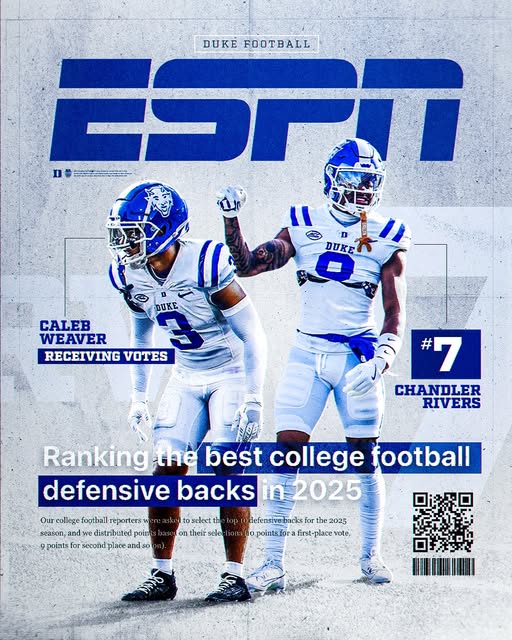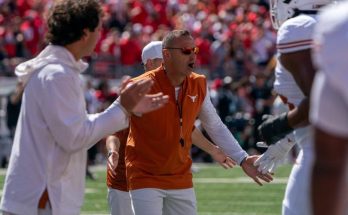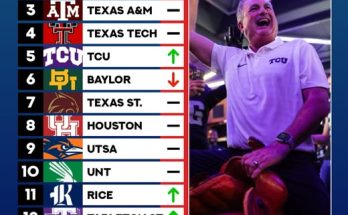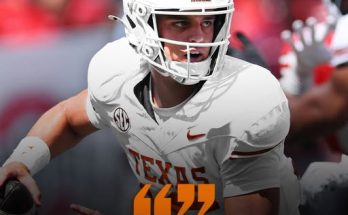When you think of dominant cornerback duos in college football history, names like Patrick Peterson and Tyrann Mathieu, or Marlon Humphrey and Minkah Fitzpatrick might come to mind. But in today’s era, two names have emerged at the forefront of the national conversation: Chandler Rivers and Caleb Weaver. These two are not just playing the position—they are redefining it.
At a time when college football offenses are becoming more sophisticated, faster, and pass-heavy, the value of elite defensive backs has never been greater. Chandler Rivers and Caleb Weaver don’t merely react to these offensive evolutions—they disrupt them. They are quarterbacks of the secondary, defensive anchors, and in many ways, silent assassins whose impact stretches beyond the stat sheet. And while they play at different programs, what unites them is the way they’ve both dominated and influenced their respective teams, conferences, and the national scene.
Chandler Rivers, the lockdown corner from Duke University, is the embodiment of quiet confidence and technical excellence. A former three-star recruit from Beaumont, Texas, Rivers arrived in Durham without much fanfare. He wasn’t projected to be an instant game-changer. But from the moment he stepped on the field, Rivers played like he had something to prove—and he’s been proving it ever since.
With a wiry but strong 5-foot-10, 185-pound frame, Rivers uses pristine footwork, exceptional instincts, and high football IQ to suffocate receivers. He’s one of the few cornerbacks who rarely gets targeted, and when he does, quarterbacks regret it. In man coverage, he’s relentless. In zone, he reads the quarterback’s eyes like a seasoned veteran. But what makes Rivers truly special is his poise. Even when matched up against the top receivers in the country, he never panics. He doesn’t hold. He doesn’t flinch. He just blankets.
Rivers’ breakout came in his sophomore year when he recorded four interceptions, 13 pass breakups, and allowed a completion percentage of just 41.7% when targeted. This past season, he elevated his game even further—so much so that most teams stopped throwing his way altogether. He’s become the type of corner who eliminates one side of the field. That’s not just talent; that’s fear. And in college football, where tempo offenses and quick throws dominate, that kind of fear is invaluable.
Meanwhile, nearly 1,000 miles away, Caleb Weaver is setting his own standard at the University of Michigan. At 6-foot-2, 200 pounds, Weaver is built like an NFL prototype. His game is different from Rivers in style but equal in impact. If Rivers is the technician, Weaver is the enforcer. He hits with the force of a linebacker and covers with the fluidity of a corner. He’s the rare safety who can play single-high, box, or slot—and look elite at all three.
Weaver’s rise has been meteoric. Coming out of high school as a top-50 national prospect, expectations were high. But Weaver didn’t just meet those expectations—he shattered them. In his second season with the Wolverines, he was already wearing the green dot on his helmet, signaling his role as the communicator and captain of Michigan’s secondary. That level of trust from coaches tells you everything you need to know.
Statistically, Weaver fills up the box score. He tallied over 90 tackles last season, along with four interceptions, two forced fumbles, and a pair of sacks. But the stats only tell part of the story. Watch the tape, and you’ll see a player with an unmatched motor and fearlessness. He’s the guy breaking up a pass on third-and-8, then delivering a bone-jarring hit on a fourth-down goal-line stand. He plays with passion, precision, and pride.
But what really separates Weaver is his versatility. In an era where defenses have to be able to disguise coverages and adjust to the constant motion and formation shifts of today’s offenses, Weaver’s ability to play all over the field gives his coaches endless flexibility. Want to blitz him off the edge? Done. Need him to erase a tight end or slot receiver? No problem. Want to drop him deep and let him read the quarterback like Ed Reed? He can do that too.
And just like Rivers, Weaver leads not just with his play, but with his demeanor. He’s a film junkie, a weight room warrior, and a vocal leader in the locker room. Teammates call him the “coach on the field,” and head coach Jim Harbaugh once described him as “the heartbeat of our defense.” Those aren’t compliments—they’re realities.
Together, Chandler Rivers and Caleb Weaver represent the future of the position. They’re part of a new wave of defensive backs who combine athleticism with intelligence, toughness with tact, swagger with substance. They don’t just want to play football—they want to master it.
Their impact goes beyond Saturdays, too. NFL scouts are salivating at the thought of what Rivers and Weaver could become at the next level. Some believe Rivers has the best feet and hips in the country among corners, while Weaver is already drawing comparisons to Derwin James and Kyle Hamilton. It’s not just about speed or strength—it’s about instincts, vision, and trust. And both possess those in abundance.
But perhaps what’s most compelling about Rivers and Weaver is their attitude. In a time when NIL deals, transfer portals, and media hype can shift focus, both have remained grounded. They’re focused on winning, on their teammates, and on making each rep count. You won’t find them doing flashy interviews or showboating after every play. Their highlight tapes are loud, but their personalities are steady.
Rivers is known on campus for being soft-spoken but respected. Coaches rave about his professionalism, his discipline, and his ability to break down film like a coach. Weaver, by contrast, is more vocal but just as humble. He hosts weekly dinners for his teammates, leads team Bible studies, and routinely stays after practice to help younger players learn the playbook.
Their legacies are already cementing themselves. Rivers has transformed Duke’s secondary into one of the ACC’s stingiest units, turning a program long known for offense into a defensive force. Weaver has kept Michigan’s defensive backfield among the nation’s elite and brought a level of physicality and polish that has become the program’s identity.
As the 2025 season looms, both players are expected to be in the conversation for the Jim Thorpe Award, given annually to the best defensive back in college football. But for Rivers and Weaver, it’s not about awards. It’s about excellence. It’s about locking down the guy in front of you and doing your job. Every play. Every game.
They may not wear the same jersey, but Chandler Rivers and Caleb Weaver are connected by something deeper—the pursuit of greatness. In an age of explosive offenses and endless highlight reels, these two defenders have dared to make defense sexy again. They’ve restored the art of the shutdown, the science of disguise, and the poetry of precision tackling.
They’re not just two of the best defensive backs in college football.
They’re two of the best players in college football—period.
And they’re just getting started.



